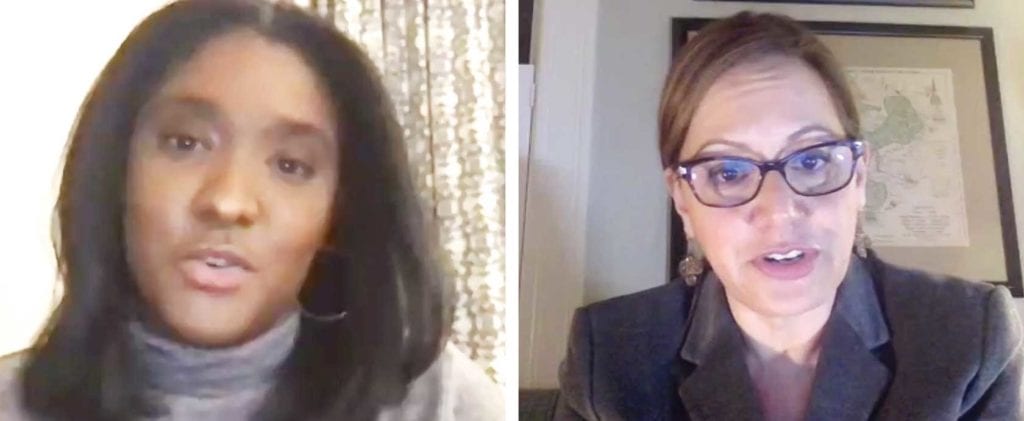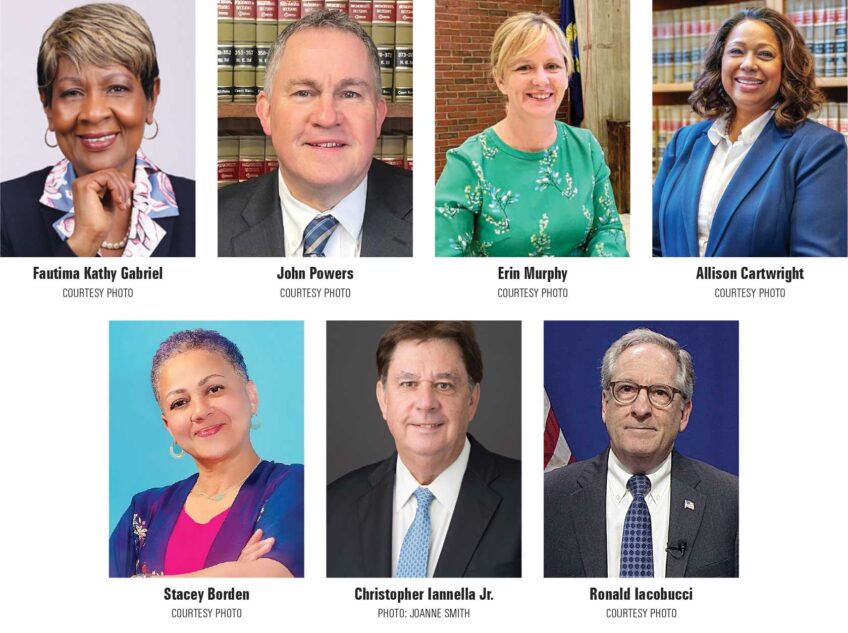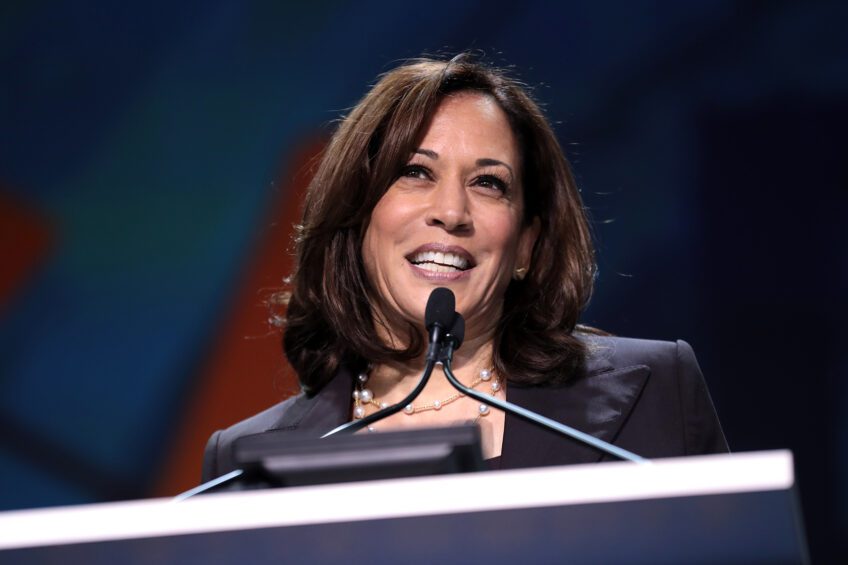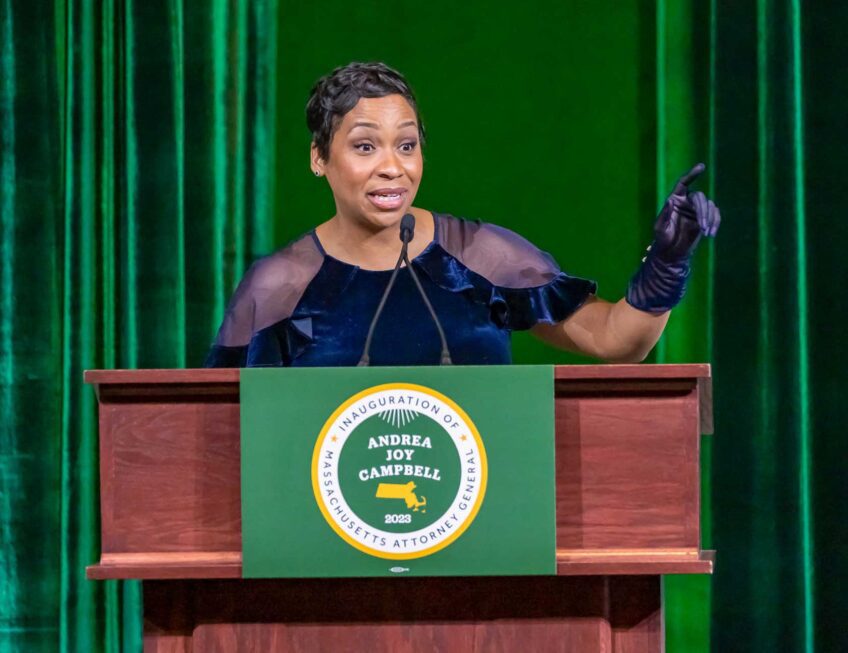Police funding becomes a wedge issue in campaigns
Annissa Essaibi George, Mary Tamer paint their rivals as anti-police

With polls showing Michelle Wu more than 30 points ahead of Annissa Essaibi George, the mayoral race heated up Monday with the super PAC Bostonians for Real Progress dropping an advertisement blasting Wu for allegedly advocating for defunding the Boston police.
“Wu would defund the police, reducing positions and forcing layoffs,” the PAC, which is backing Essaibi George, claims. The PAC also charges Wu with advocating for defunding essential services and defunding the MBTA.
While Wu never mentioned police funding in her opposition to this year’s budget, nor explicitly called for defunding the police, the issue has taken on a life of its own during the final weeks of this year’s mayoral and council election.
In another race, District 6 candidate Mary Tamer leveled charges that her rival for the seat, Kendra Hicks, plans to defund the police.
 A flyer circulated by Tamer’s campaign last week shows a color photo of Tamer, who is white and identifies as Arab American, opposite a darkened black-and-white image of Hicks, who is a Dominican of African descent, along with the message, “There are stark differences between the candidates for District 6 City Council.”
A flyer circulated by Tamer’s campaign last week shows a color photo of Tamer, who is white and identifies as Arab American, opposite a darkened black-and-white image of Hicks, who is a Dominican of African descent, along with the message, “There are stark differences between the candidates for District 6 City Council.”
The flyer, with its racial overtones, drew swift rebuke from Hicks’ supporters, including the group J.P. Progressives, which accused Tamer of engaging in “ugly tactics of shaming and racist fear-mongering.”
For her part, Tamer issued a statement on Twitter acknowledging that the flyer was in error.
“The photo used was never intended to cause harm or show racial animus, but it is clear, based on the feedback we have received and heard, that it did not set the right tone,” she wrote. “Candidates for public office make errors in the midst of long campaign days, and everyone on this multiethnic, multilingual campaign team has learned a valuable lesson.”
What does it mean?
The concept of defunding police departments gained traction nationally in the wake of the police murders of George Floyd in Minneapolis and Breonna Taylor in Louisville, Kentucky. Rahsaan Hall, director of the Racial Justice Program for the American Civil Liberties Union of Massachusetts, says the term is not commonly used to mean removing all funding from a police department.
“It describes efforts to take funds away from police departments and reinvest them in community-based services that address the underlying reasons people call the police — substance abuse, mental health issues, trauma,” he said.
In a Suffolk University poll released Tuesday, 56% of respondents said they are in favor of reallocating “some police funding into mental health and social programs,” while 26% agreed with the statement that “the police need more funding.” Just 10% supported defunding the police.
Tamer and Essaibi George are both running to the right of the more progressive-leaning Hicks and Wu. More importantly, the two placed well behind their rivals in the Sept. 14 preliminary. With early voting set to begin this weekend, the campaigns of Tamer and Essaibi George appear to have gone negative in an attempt to clearly differentiate the candidates from Hicks and Wu.
While Hicks in social media posts has called for reducing police funding, she has not advocated for defunding the police as part of her campaign platform.
Tamer’s flyer could be an attempt to stoke voters’ fear of crime, notes Chris Williams, a defense attorney and clinical instructor at the Harvard Law School Criminal Justice Institute.
“I could see how some might think that would work as a scare tactic,” Williams said.
Hall says the mood of the public has changed since beginning of the social unrest sparked in 2020 by the Floyd and Taylor murders.
“The narrative of public safety is no longer beyond reproach,” he said. “This idea that public safety can only be effected by police has come under scrutiny from all sectors and ideologies.”
Wu’s win in the preliminary was substantial. She garnered 33% of the vote, besting Essaibi George by 10 points. Her 30-point lead in the latest poll released to the public could mean she’s picking up support from those who voted for acting Mayor Kim Janey, City Councilor Andrea Campbell and former Chief of Economic Development John Barros in the Sept. 14 preliminary election.
Hicks also made an impressive political debut in the preliminary. Tamer, a former Boston School Committee member and former director of the Boston Charter School Alliance, finished more than 1,200 votes behind Hicks in the District 6 preliminary.
Williams said Wu and Hicks may be more aligned with the electorate than are Essaibi George and Tamer.
“The candidate who is more in line with the wishes of Boston is doing well,” he said. “It’s pretty clear there’s an old Boston establishment choice and there’s a new way of doing things.”





